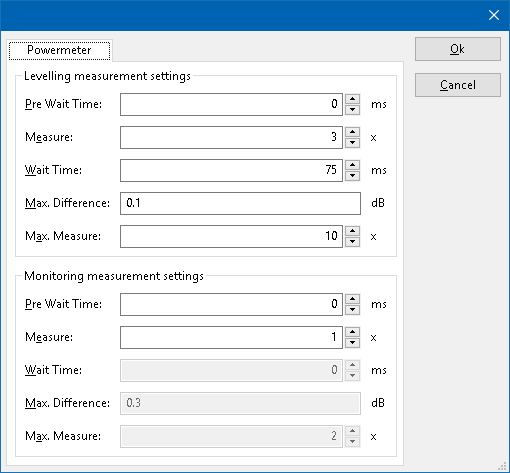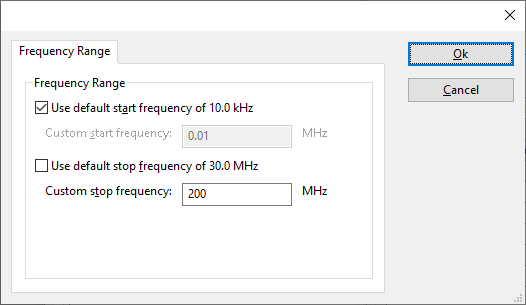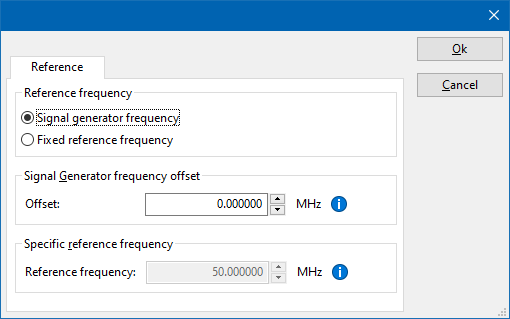Rohde & Schwarz NRP-Z57
The Rohde & Schwarz NRP-Z57 device driver is a Power Meter which is supported by RadiMation®.
Configuration[edit]
The following tabs are available in the advanced configuration of the Rohde & Schwarz NRP-Z57:
| Wait time before starting the measurement-loop. Can be used to wait for a signal generator, and or amplifier to stabilize. |
| The minimum amount of measurements in the measure loop. Continues to loop even if power level is stable. |
| The wait time between each measurement is taken, during the measurement-loop. |
| If the measured power between each measurement in the measurement-loop, is less than this value. The measured power is stable. The measurement-loop will then stop. |
| The maximum amount of measure times, for the measurement-loop |
According to these settings, RadiMation® will perform a minimum of 3 power measurements with a wait time between the measurements of 75ms. If all those 3 measurements are within 0.1 dB, the power measurement is assumed to be stable, and RadiMation® will continue to average of the last 3 measurements. If the difference between the measurements is larger than the specified 0.1 dB, an additional power measurement will be performed, and the last 3 samples will be compared to the 0.1 dB difference again. At most 10 measurements will be performed if the difference between the 3 samples will not be within the specified 0.1 dB.
Both for the leveling, and the monitoring these settings can be set individually. The leveling is used, whenever RadiMation® is measuring the power, to regulate the signal generator. If the powermeter is only used as input, without regulating on it, then the monitoring settings are used.
More detailed information on how to achieve a fast and stable power measurement is available in Application Note 106: Powermeter parameter configuration.
The frequency range of the Rohde & Schwarz NRP-Z57 as provided by the manufacturer is shown and selected as default. It is possible to overrule these frequencies and to manual adjust the allowed frequency range of the Rohde & Schwarz NRP-Z57.
| If the checkbox is checked, the default start frequency will be used as the lowest usable frequency in a test for this device. |
| If the Use default start frequency checkbox is unchecked, another start frequency (expressed in MHz) can be specified. The customized start frequency will then be used as the lowest usable frequency in a test for this device. The customized frequency can be a limitation or an extension of the default start frequency. |
| If the checkbox is checked, the default stop frequency will be used as the highest usable frequency in a test for this device. |
| If the Use default stop frequency checkbox is unchecked, another stop frequency (expressed in MHz) can be specified. The customized stop frequency will then be used as the highest usable frequency in a test for this device. The customized frequency can be a limitation or an extension of the default stop frequency. |
Specifying a different frequency range can be useful if for example:
- A device (like a coupler, antenna, injection device, cable, etc...) is still useable (but out of specification) outside the standard suggested frequency range.
- An external mixer is used to measure an extended frequency range.
- An up- or down-convertor is used to shift the frequency range.
- A newer model of a device is present that has an extended frequency range, and still uses the same remote control commands.
Be careful changing these setting as RadiMation® is no longer able to verify if the Rohde & Schwarz NRP-Z57 is used outside frequency range that is specified by the manufacturer. This may result to serious damage of your measurement device.
The settings on the Reference tab influence the measurement frequency that is communicated to the measurement device. The frequency that is forwarded to the measurement device can for example be used by the device to perform the measurement on the correct frequency, or use the correct internal frequency dependant correction or calibration factor on the measurement result. Normally it is desired that the measurement frequency is the same as the carrier frequency of the signal generator. In some situations it can however be required to communicate a different frequency to the measurement device. In such a situation the settings on the Reference tab can be modified.
| Selects that the actual carrier frequency of the signal generator is communicated to the measurement device. This is the default behaviour. |
| Selects that a fixed frequency (independent of the signal generator carrier frequency) is communicated to the measurement device. |
| An additional offset frequency specified in MHz, that is added to frequency that is communicated to the measurement device. This value can be positive or negative, and defaults to 0.0 MHz. |
| The fixed reference frequency specified in MHz that is communicated to the measurement device, when the Fixed reference frequency option is selected. |
| Warning: | When a different reference frequency is specified and communicated to the measurement device, it is only relevant for the measurement device. A correction file that is attached to the device driver in RadiMation® will still use the correction value that is specified for the actual signal generator carrier frequency. |
Rohde & Schwarz NRP-Z57 Notes[edit]
- The RadiMation® device driver can only be used if the program NRPView, 1.0.27 or above, from Rohde & Schwarz is installed. When installing the program make sure that you install all the items. If not all items are installed, some required DLL's are not installed.
- Setting the resolution higher will make the measurement slower because the power meter is taking more samples and perform an average over the samples. This is done dynamically depending on the power measured.
- The syntax for the Instrument Descriptor is as follows:
USB::<vendor Id>::<product Id>::<serial number>, where:- <vendor Id> is 0AAD for Rohde&Schwarz
- <product Id> depends on the sensor
- <serial number> you can find on your sensor. Serial number is a number with 6 digits. For example: 900003
The <product Id> is depending on the specific model of the powerhead, and can be looked up from the table:
| Powerhead model | <product Id> |
|---|---|
| NRP-Z21 | 0x0003 |
| NRP-FU | 0x0004 |
| FSH-Z1 | 0x000B |
| NRP-Z11 | 0x000C |
| NRP-Z22 | 0x0013 |
| NRP-Z23 | 0x0014 |
| NRP-Z24 | 0x0015 |
| NRP-Z51 | 0x0016 |
| NRP-Z52 | 0x0017 |
| NRP-Z55 | 0x0018 |
| NRP-Z56 | 0x0019 |
| FSH-Z18 | 0x001A |
| NRP-Z91 | 0x0021 |
| NRP-Z81 | 0x0023 |
| NRP-Z31 | 0x002C |
| NRP-Z37 | 0x002D |
| NRP-Z96 | 0x002E |
| NRP-Z27 | 0x002F |
| NRP-Z28 | 0x0051 |
| NRP-Z98 | 0x0052 |
| NRP-Z92 | 0x0062 |
| NRP-Z57 | 0x0070 |
| NRP-Z85 | 0x0083 |
| NRPC40 | 0x008F |
| NRPC50 | 0x0090 |
| NRP-Z86 | 0x0095 |
| NRP-Z41 | 0x0096 |
| NRP-Z61 | 0x0097 |
| NRP-Z71 | 0x0098 |
| NRP-Z32 | 0x009A |
| NRP-Z211 | 0x00A6 |
| NRP-Z221 | 0x00A7 |
| NRP-Z58 | 0x00A8 |
| NRPC33 | 0x00B6 |
| NRPC18 | 0x00Bf |
| NRPC18-B1 | 0x00C1 |
| NRPC33-B1 | 0x00C2 |
| NRPC40-B1 | 0x00C3 |
| NRPC50-B1 | 0x00C4 |
| NRP8S | 0x00E2 |
| NRP8SN | 0x0137 |
| NRP18S | 0x0138 |
| NRP18SN | 0x0139 |
| NRP33S | 0x0145 |
| NRP33SN | 0x0146 |
| NRP18S-10 | 0x0148 |
| NRP18SN-10 | 0x0149 |
| NRP18S-20 | 0x014A |
| NRP18SN-20 | 0x014B |
| NRP18S-25 | 0x014C |
| NRP18SN-25 | 0x014D |
| NRP18A | 0x014E |
| NRP18AN | 0x014F |
| NRP18T | 0x0150 |
| NRP18TN | 0x0151 |
| NRP33T | 0x0152 |
| NRP33TN | 0x0153 |
| NRP40T | 0x0154 |
| NRP40TN | 0x0155 |
| NRP50T | 0x0156 |
| NRP50TN | 0x0157 |
| NRP67T | 0x0158 |
| NRP67TN | 0x0159 |
| NRP110T | 0x015A |
| NRP40S | 0x015F |
| NRP40SN | 0x0160 |
| NRP50S | 0x0161 |
| NRP50SN | 0x0162 |
| NRP33SN-V | 0x0168 |
| NRP6A | 0x0178 |
| NRP6AN | 0x0179 |
| NRPM3 | 0x0195 |
Examples: "USB::0x0AAD::0x000B::900003"
You can use '*' for <product Id> or <serial number>. It is however suggested to use fully qualified resource descriptors, when more than one sensor is connected. The asterisk placeholder, can only be used when only one single sensor is connected.
Examples:
- "USB::0x0AAD::0x000C::*" - Opens first NRP-Z11 sensor on the USB bus
- "USB::0x0AAD::*" - Opens first R&S sensor on the USB bus
- "*" - Opens first R&S sensor on the USB bus
Related RadiMation errors[edit]
- RadiMation Error: -1074001424: "Instrument status error". This error is raised when a zero is performed on the power meter, and too much power is present during the zero operation. In this case, decrease the applied power and perform the zero operation again.
Installation[edit]
Please go the official website of the manufacturer Rohde & Schwarz and go to the page of your R&S®NRP Average Power Sensor model.
Apparently the required component for this driver is the R&S® NRP-Toolkit.
Install the R&S NRP-toolkit for Windows: https://www.rohde-schwarz.com/software/nrp-z2x1/?facet=facet.SoftwareType&facet.SoftwareType=Tools


